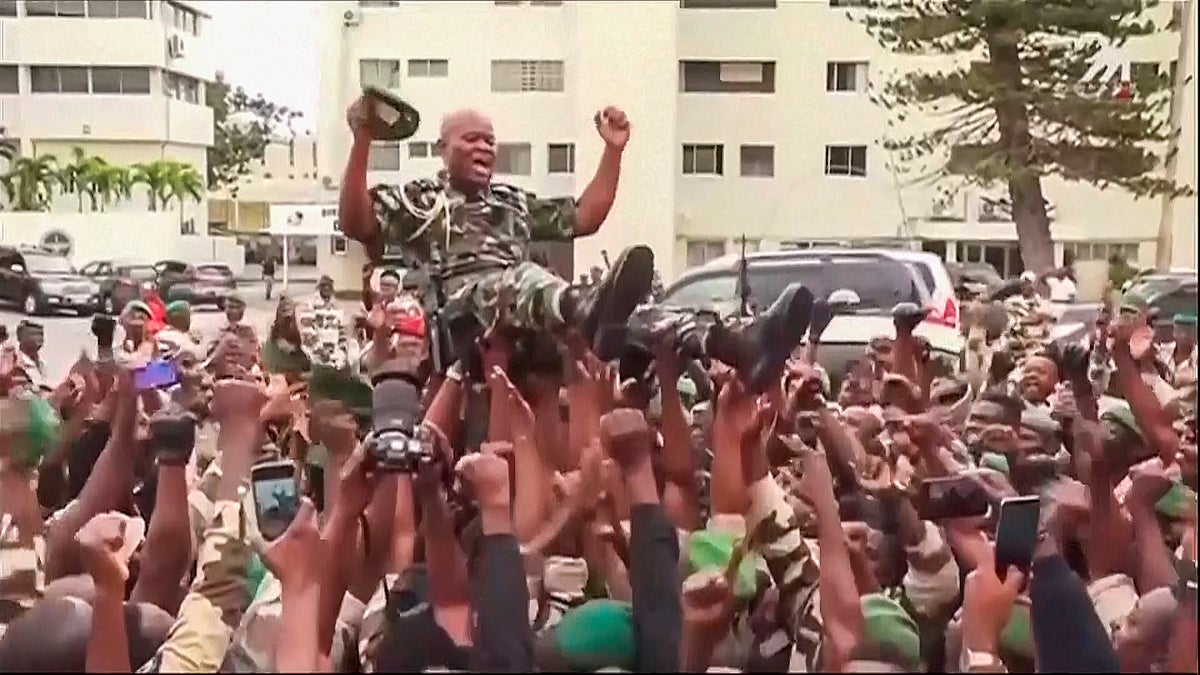
Gabon’s military declared General Brice Oligui Nguema as the country’s new leader and celebrated his ascent to power by parading him through the streets of the capital, as world leaders roundly condemned the coup.
General Oligui was “unanimously” designated president of a transitional committee to lead the country by mutinous soldiers on Gabon’s state TV.
Visuals from the West African country showed the new leader being carried on the shoulders of soldiers who cheered for him in the streets of capital Libreville.
World leaders have criticised the overthrowing of president Ali Bongo’s government and raised concerns over the global implications for instability in the former French colony.
A dozen senior officers appeared on television to declare a coup d’état, minutes after the central African country’s election body announced Mr Bongo had won a third term in a disputed election.
The coup marked an end to the Bongo family’s 55-year-long rule.
Following the announcement by military leaders, Mr Bongo and other politicians were placed in house arrest and their phones were seized.
Releasing a video from the detention centre before his phone was taken away, Mr Bongo urged people to come out on the streets in his support and “make noise”.
A defaced billboard of Gabon president Ali Bongo Ondimba is seen on an empty street of Libreville— (AP)
“I’m calling you to make noise, to make noise, to make noise really,” he said in English.
However, the ouster has sparked celebrations in the streets of Libreville, with many people seen dancing and singing. The capital has been a stronghold of the opposition party that lost the latest election.
There was a long-simmering resentment of the Bongo family among some as the dynasty was accused of getting rich through the country’s resources as many of its citizens struggled to eke out a living.
UN chief Antonio Guterres condemned the coup and called on military leaders to ensure the Mr Bongo’s safety and that of his family, spokesman Stephane Dujarric said.
Colonel Ulrich Manfoumbi Manfoumbi (centre), spokesperson of the Committee for the Transition and Restoration of Institutions (CTRI), reading a statement on television— (Gabon 24/AFP via Getty Images)
The UK also condemned the “unconstitutional military takeover” of power in Gabon.
“The UK condemns the unconstitutional military takeover of power in Gabon and calls for the restoration of constitutional government,” the Foreign, Commonwealth & Development Office said on Wednesday.
“We acknowledge concerns raised regarding the recent electoral process, including restrictions on media freedom.”
Canada said it was deeply concerned by the situation in Gabon and demanded a quick and peaceful return of power to democratic and inclusive civilian-led governance.
People celebrate in support of the putschists in a street of Libreville on 30 August— (REUTERS)
French government spokesperson Olivier Veran said: “We condemn the military coup and recall our commitment to free and transparent elections.”
General Oligui, a cousin of Mr Bongo, used to be his father’s bodyguard, said Desire Ename, a journalist with Echos du Nord, a local media outlet. The late Omar Bongo had ruled Gabon for 42 years until his death in 2009.
The general was head of the secret service in 2019 before he replaced Mr Bongo’s step-brother to become Gabon’s Republican Guard.
Residents gesture and hold a Gabon national flag as they celebrate in Libreville— (AFP via Getty Images)
The coup leaders vowed to respect “Gabon’s commitments to the national and international community” and accused the ousted president of “unpredictable, irresponsible governance” that threw the country into chaos.
The coup leaders said people around the president had been arrested for “high betrayal of state institutions, massive embezzlement of public funds (and) international financial embezzlement”.
The president’s son, Noureddin Bongo Valentin, and others were among those arrested on allegations of corruption and treason.
This video grab shows coup supporters cheering police officers in Libreville on 30 August— (AP)
Experts have warned that the takeover will bring more instability to the region and actual intentions of takeover of power could be emerging from divisions among the ruling elite than efforts to improve the lives of ordinary Gabonese.
The Bongo family is linked to “systematic misappropriation of state revenues”, but the latest events “should be viewed with great caution, as they offer no guarantee of good governance and democratic transition,” said Sherpa, a French non-profit.
Gabon is a member of the Organization of the Petroleum Exporting Countries (Opec).
It produces some 181,000 barrels of crude oil a day, and its population has endured high unemployment despite the high production. Nearly 40 per cent of Gabonese citizens aged between 15 and 24 were out of work in 2020, according to the World Bank.







